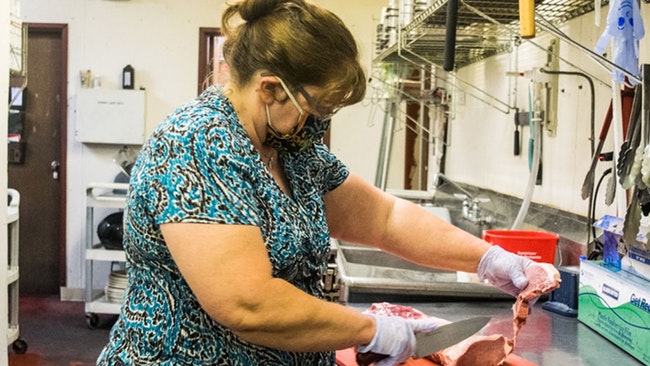
Reva Kirby, owner of Kirley’s Family Dining restaurant in Ontario prepares a meal for the Meals on Wheels program last summer. (The Enterprise/Kezia Setyawhan).
ONTARIO – In a sign of the expanding effect of the Covid epidemic the number of seniors who utilize a local program that provides food nearly doubled in the past year.
Last year at this time the Meals on Wheels program operated by the Malheur Council on Aging and Community served 64 people in the county. Now the program is delivering meals to 124 people with another 30 on a waiting list.
“Primarily it is because of the isolation from Covid,” said Sandy Shelton interim director of Malheur Council on Aging.
Covid cases appeared locally in late March and restrictions to slow the spread of the virus are now hitting area homebound seniors hard, said Shelton.
“They are really suffering from isolation. They are feeling afraid and very cut off,” said Shelton.
Shelton said signs of depression with homebound seniors are also rising.
“They feel like they can’t go anywhere. There are so many negative effects from Covid and this is definitely one of them,” said Shelton.
That’s why, said Shelton, the Meals on Wheels program is so needed.
“That’s a positive thing we have for seniors who need it, getting a nice hot meal delivered to their home,” said Shelton.
Shelton said her agency is “working doing applications and putting them into the program as quickly as we can.”
The process to sign up for Meals on Wheels begins with a phone call, said Shelton.
The person who seeks Meals on Wheels assistance then talks to a nutrition specialist and fills out an application over the phone.
“The individual is placed on a waiting list if the program is full,” said Shelton.
The number of people Meals on Wheels can support is directly influenced by the amount of money the Malheur Council on Aging can allot to the program, said Shelton.
“Basically, people are taken off of the waiting list when there are enough funds to pay for their meals,” said Shelton.
Once there is funding available, said Shelton, a nutrition specialist calls the individual in need and together they fill out another form to “ensure meal delivery the next week,” said Shelton.
The council devotes about $75,000 a year to the Meals on Wheels program. The money is generated from state and federal grants and donations.
“One third of it comes from donations and the Festival of Trees event in Ontario,” said Shelton.
Shelton said Meals on Wheels served more than 13,000 meals to local seniors through 2019 and into 2020.
Until the Covid restrictions, meals were also provided at sites in Nyssa, Vale and at the council’s building in Ontario, said Shelton. Those sites are now closed, said Shelton.
Through fiscal year 2019 and into early 2020 the meal sites furnished 3,993 meals to 328 people, said Shelton.
Health officials consider the elderly to be especially vulnerable to Covid.
The county and the state instituted specific restrictions on the size of gatherings and mandated masks and social distancing measures in large part to protect the elderly and other vulnerable population such as individuals with underlying health conditions.
That means, said Sarah Poe, Malheur County Health Department director, that community members should take Covid restrictions seriously to not only protect themselves but those who are most vulnerable.
“For the elderly, it is essential that every person in our community is wearing a mask and avoiding big gatherings to save those lives. Without those precautions, people will die,” said Poe.
Poe said health officials understand the hardship of Covid restrictions on the elderly.
“We do recognize people are isolated and experiencing hardships from that. Our public health approach has been to try to save as many lives as possible and that has required disruption to in-person services that people are used to,” said Poe.
Shelton said funding is always a challenge for the Meals on Wheels program.
That’s why donations, she said, are critical, especially when the money from state and federal grants evaporates. Additional donations mean more people can be added to the Meals on Wheels roster.
“I would like to serve all of those 30 seniors on our waiting list,” said Shelton.
Shelton said it costs $59.13 a month to provide five miles a week meal for one Meals on Wheels client.
The 30 clients on the waiting list could be placed into the program at a cost of $1,773, said Shelton.
A typical dinner meal delivered to seniors consists of a potato – or macaroni – a meat and vegetable portion, a slice of bread, a small milk and a cookie, said Shelton.
Volunteers, she said, are also needed.
“There is a background check required but we take care of the paperwork process. Volunteers can select their schedule one, two times per week,” said Shelton.
Shelton said the meal delivery usually takes an hour.
“These are chaotic, unprecedented times that are taking toll on everyone, especially our seniors,” said Shelton.
To volunteer or donate, interested individuals can contact the council at 541-889-7433.
News tip? Contact reporter Pat Caldwell at [email protected] or 541-473-3377.
YOU CAN HELP KEEP LOCAL NEWS FLOWING: Reader support allows the Enterprise to provide in-depth, accurate reporting that otherwise would not get done. Keeping the community well informed is essential. SUBSCRIBE – $5 a month, automatically. DONATE – to provide additional support.




